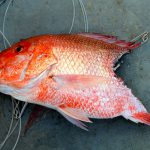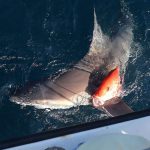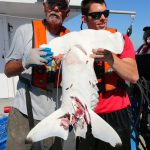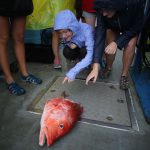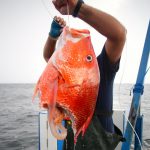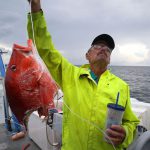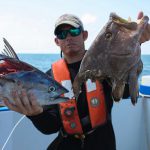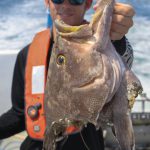Full Title: Characterizing cryptic mortality in Gulf of Mexico reef fish: Evaluating the nature and extent of depredation
The project team described the extent of depredation, or the removal of captured fish by non-target species before the fish can be retrieved by a fishing vessel, in the Gulf to improve reef fish stock assessments.
Lead Investigator: J. Marcus Drymon, Mississippi State University and Mississippi-Alabama Sea Grant Consortium, marcus.drymon@msstate.edu
Natural Resource Manager: Daniel Goethel, NOAA National Marine Fisheries Service
Project Team: Matt Ajemian (Florida Atlantic University), Angela Collins (Florida Sea Grant), Bryan Fluech (Georgia Sea Grant), Steven Gray (Michigan State University), Mandy Karnauskas (NOAA National Marine Fisheries Service), Julie Lively (Louisiana Sea Grant), Skyler Sagarese (NOAA National Marine Fisheries Service), and Steven Scyphers (Northeastern University)
Federal Program Officer/Point of Contact: Frank Parker (frank.parker@noaa.gov)
Award Amount: $118,023
Award Period: September 2021 – August 2022
Why it matters: Stock assessments rely on data from fisheries landings to set sustainable catch targets and limits. However, mortality through depredation, defined as the removal of captured fishes by non-target species, is causing managers to underestimate fish removal, resulting in inappropriate catch limits. The project team will reduce uncertainties in setting catch targets and limits by providing quantitative descriptions of depredation.
What the team did: The project team synthesized Gulf reef fish depredation datasets to examine spatial and temporal trends in depredation and assess differences in depredation across fishing gear types. They conducted a survey to collect depredation-related knowledge and observations from more than 1,000, primarily recreational fishermen. They also conducted a workshop, which allowed resource managers and scientists to develop, assess, discuss, and refine regional Gulf reef fish depredation community models. The workshop attendees also participated in facilitated discussions and reciprocal learning about Gulf reef fish depredation and identified knowledge gaps.
Summary of outcome: The team found that depredation was more pronounced in the eastern Gulf compared to the west and that shark presence was strongly associated with depredation. Seventy-seven percent of survey respondents had experienced a depredation event, but most noted that they had not changed the way they fish due to depredation. Using the information gathered from the synthesis, survey, and workshop, the team developed a research and application plan to estimate the current rate of depredation, quantify changes in depredation over time, and determine how changes in shark populations affect important fishery populations in the Gulf.
Aug. 20, 2024 – Sharks are taking a bite out of anglers’ catch in the Gulf of Mexico, but culling isn’t likely to help, The Conversation
Jun. 1, 2022 – Gulf Coast Fisherman Newsletter Issue 26, Mississippi State University
Dec. 1, 2021 – Gulf Coast Fisherman Newsletter Issue 24, Mississippi State University
Not applicable
 Official websites use.gov
A .gov website belongs to an official government organization in the United States.
Official websites use.gov
A .gov website belongs to an official government organization in the United States.
 Secure .gov websites use HTTPS
A lock or https:// means you’ve safely connected to the .gov website. Share sensitive information only on official, secure websites.
Secure .gov websites use HTTPS
A lock or https:// means you’ve safely connected to the .gov website. Share sensitive information only on official, secure websites.
